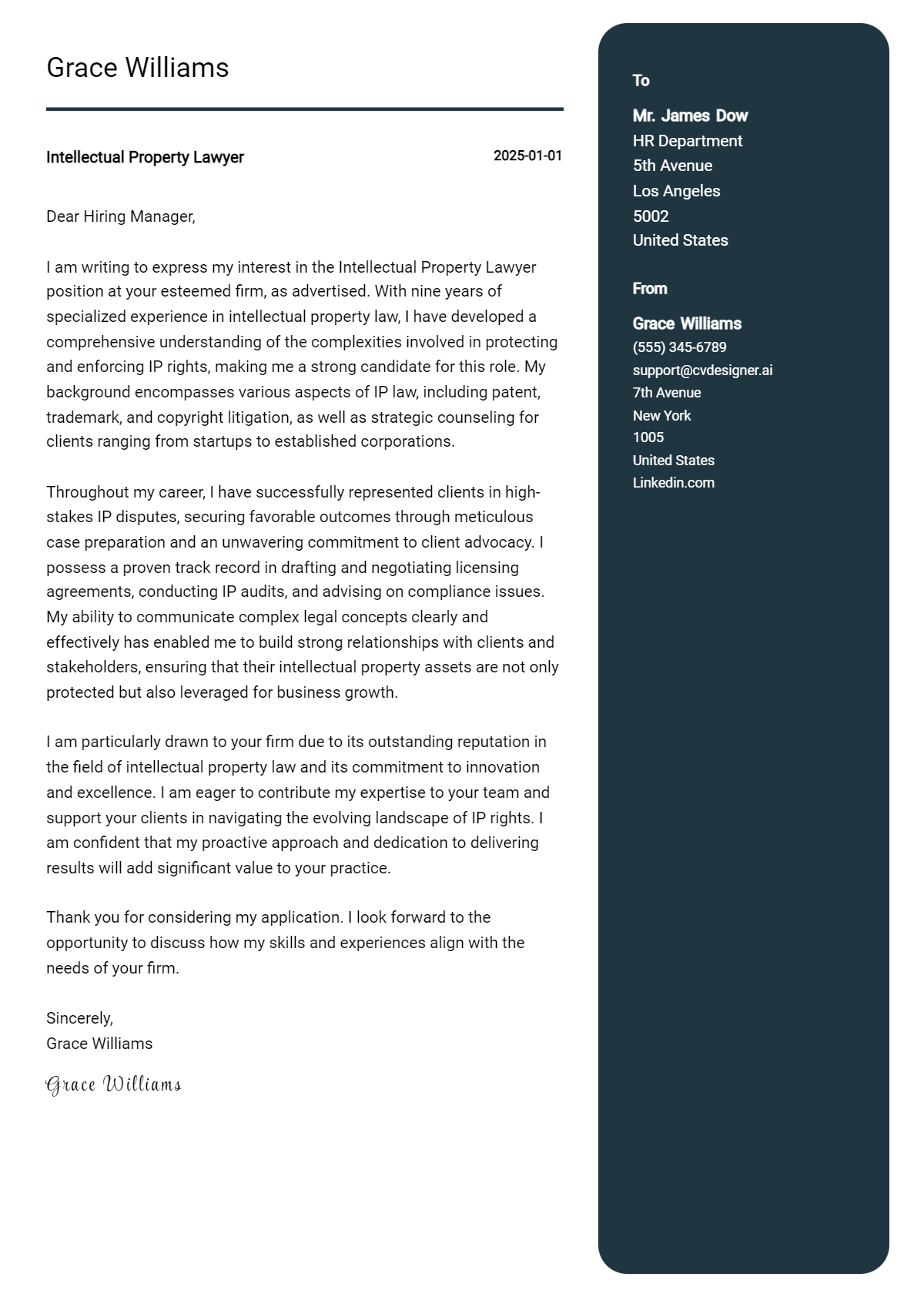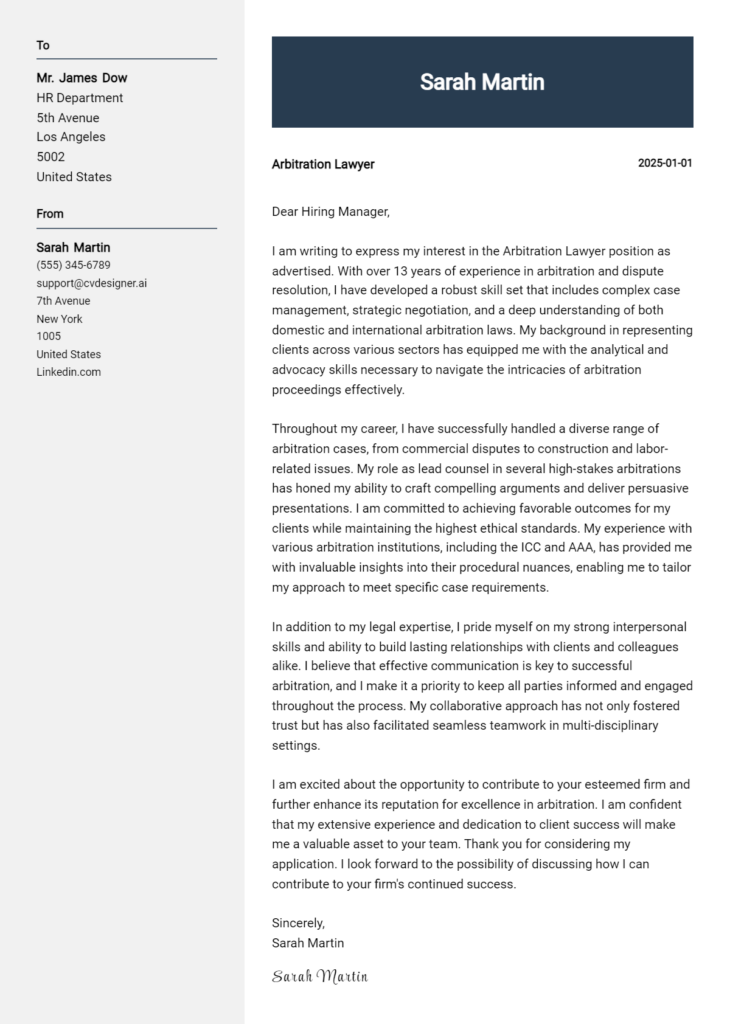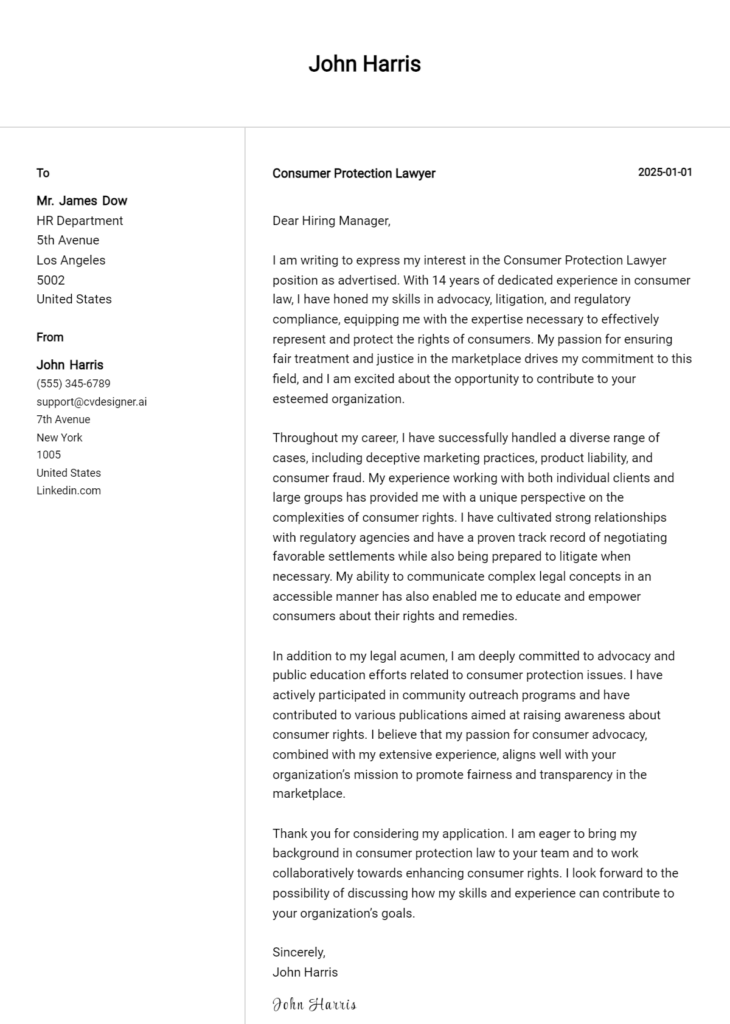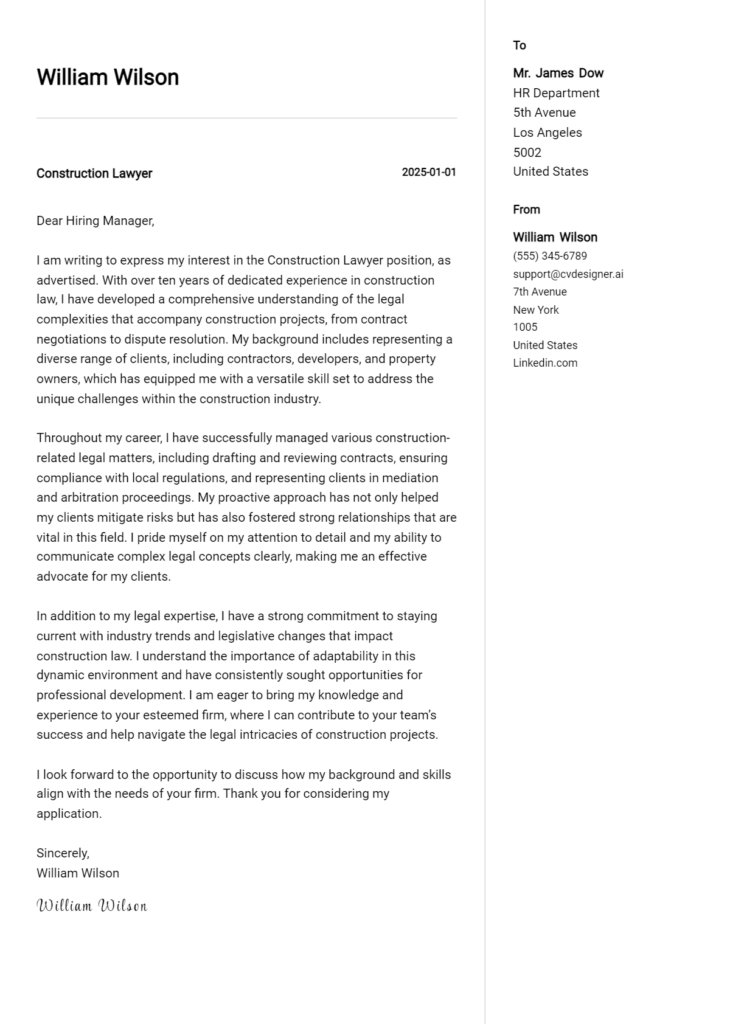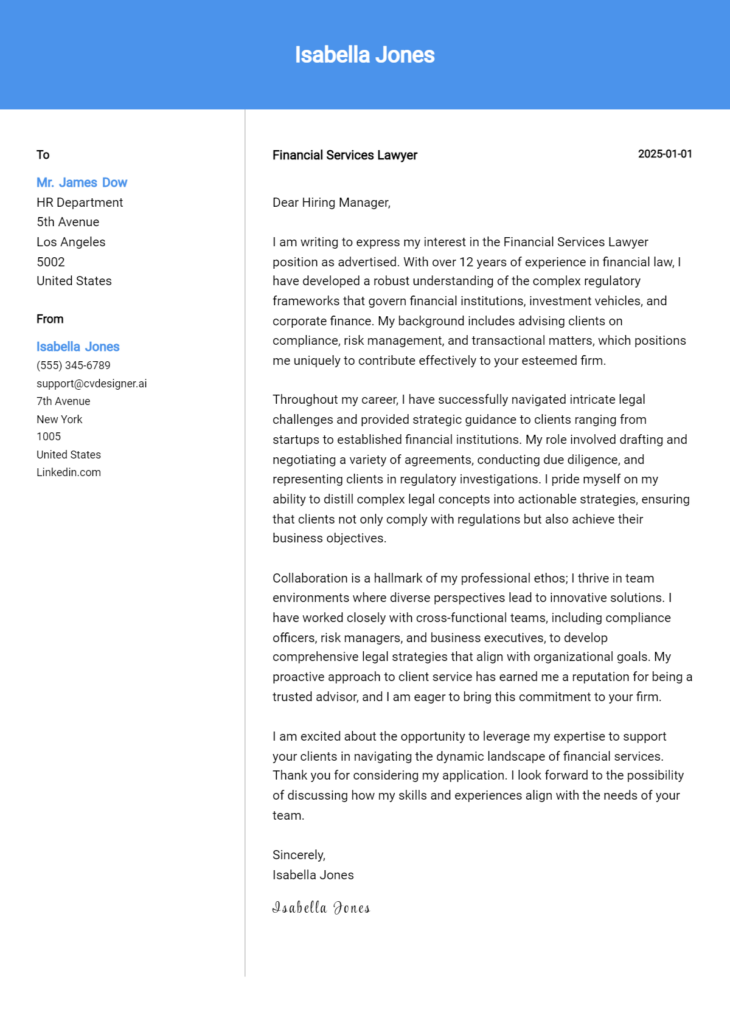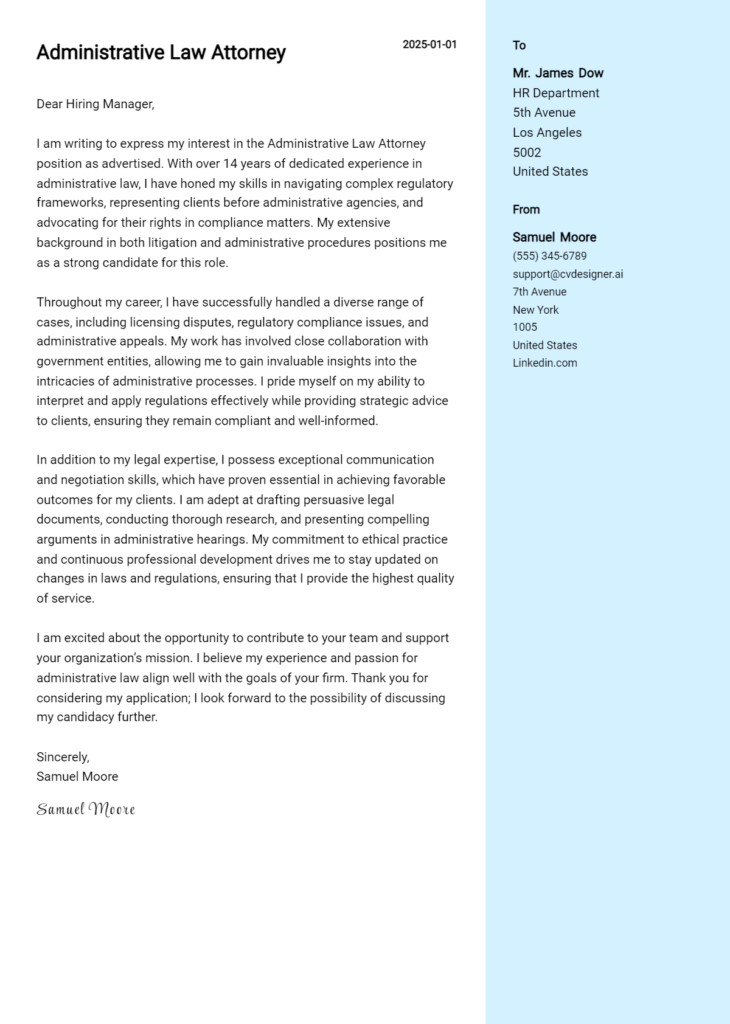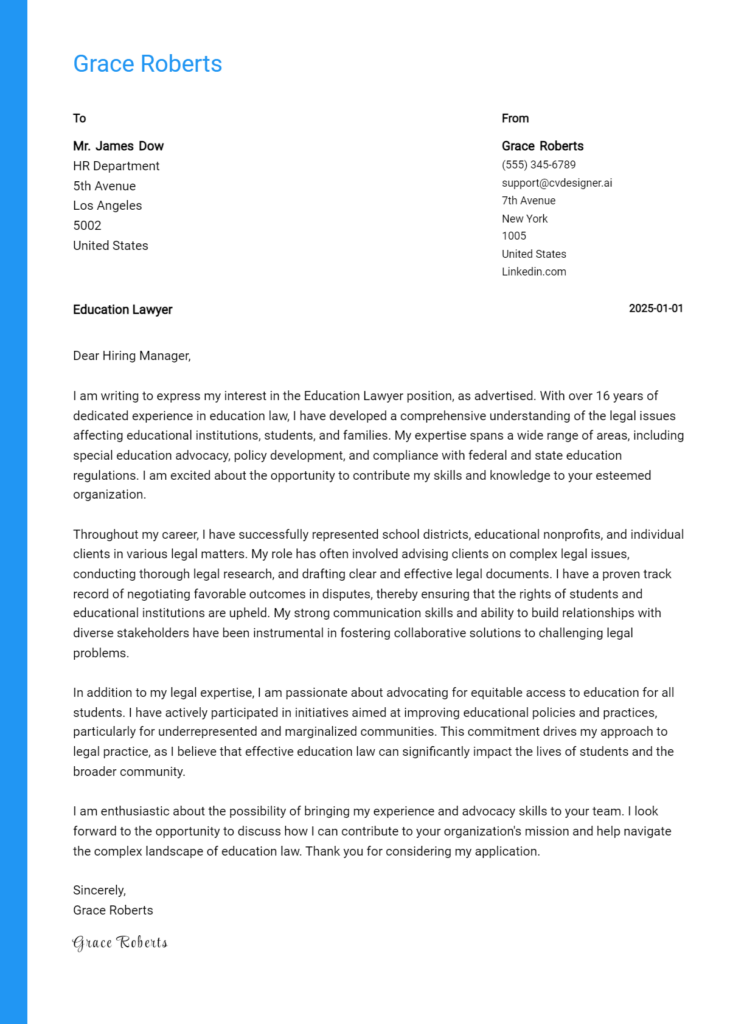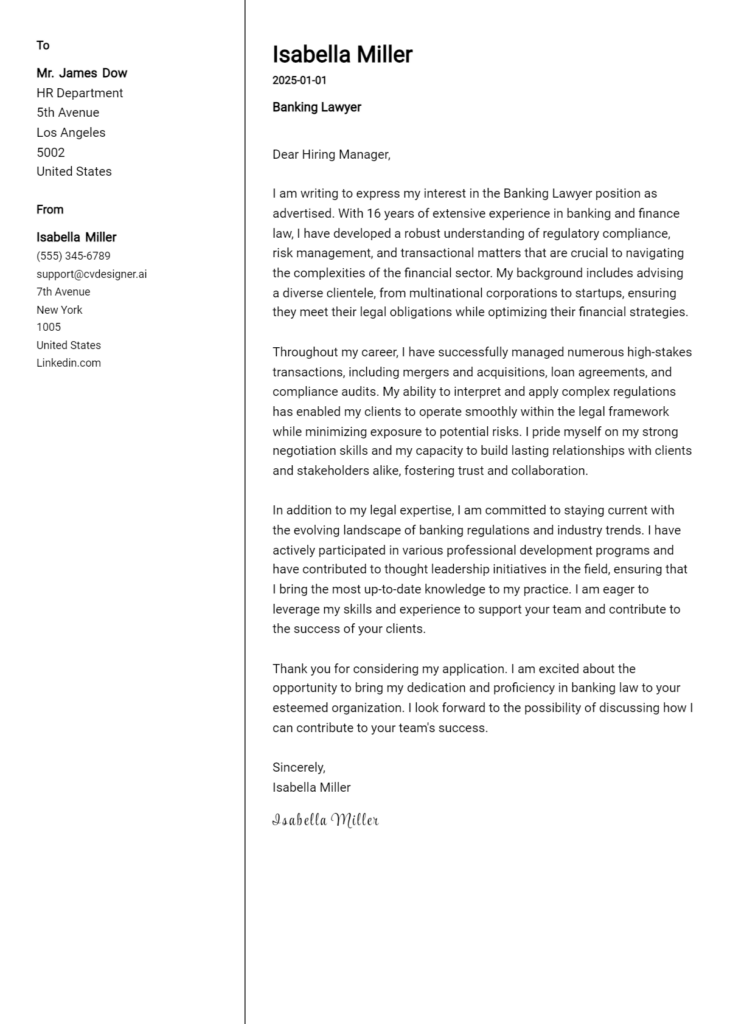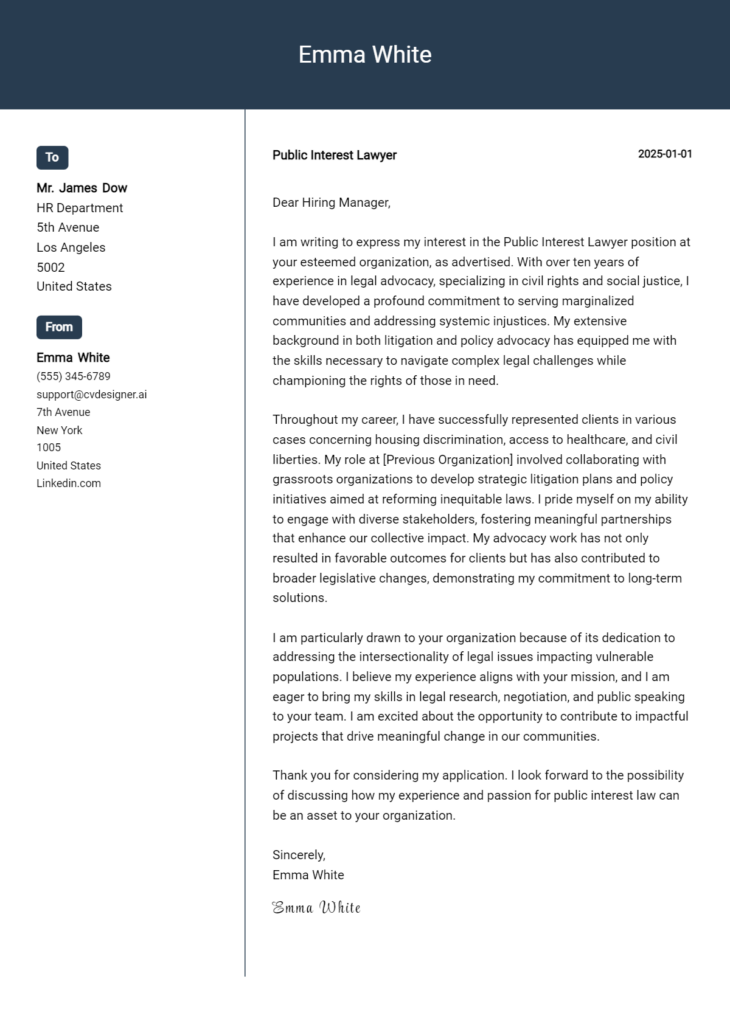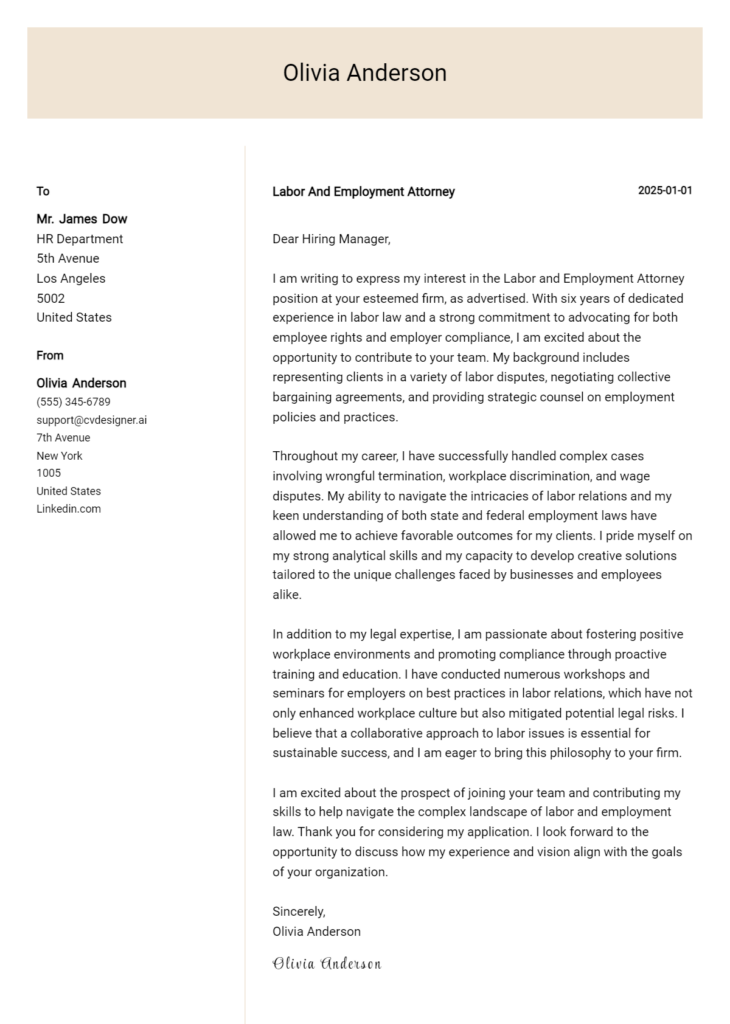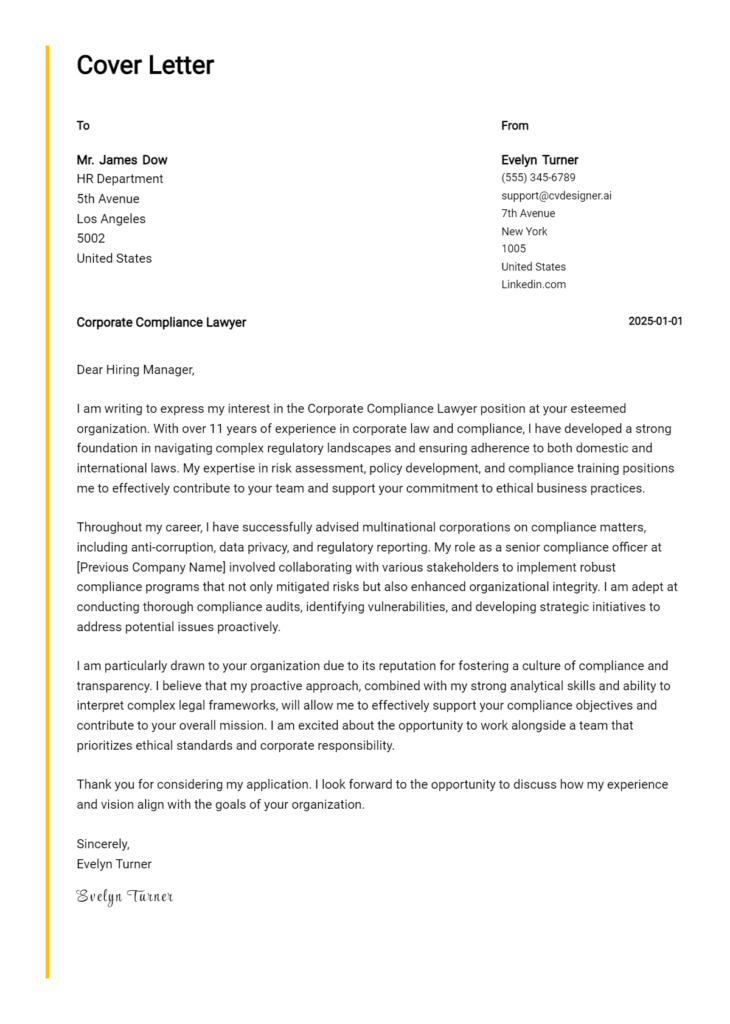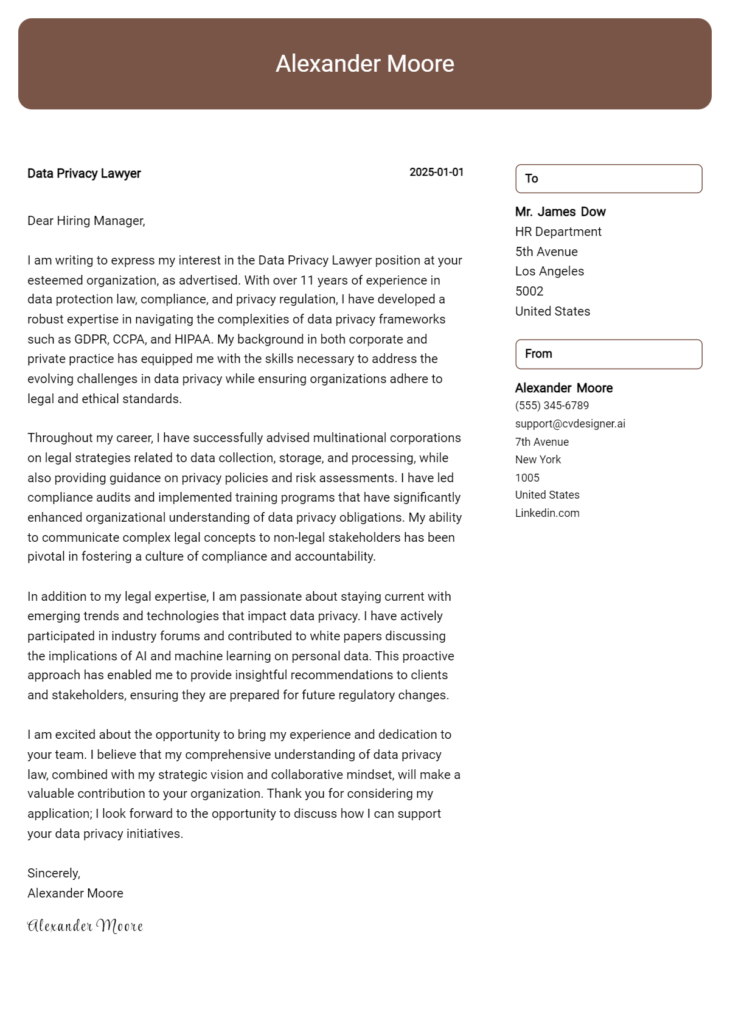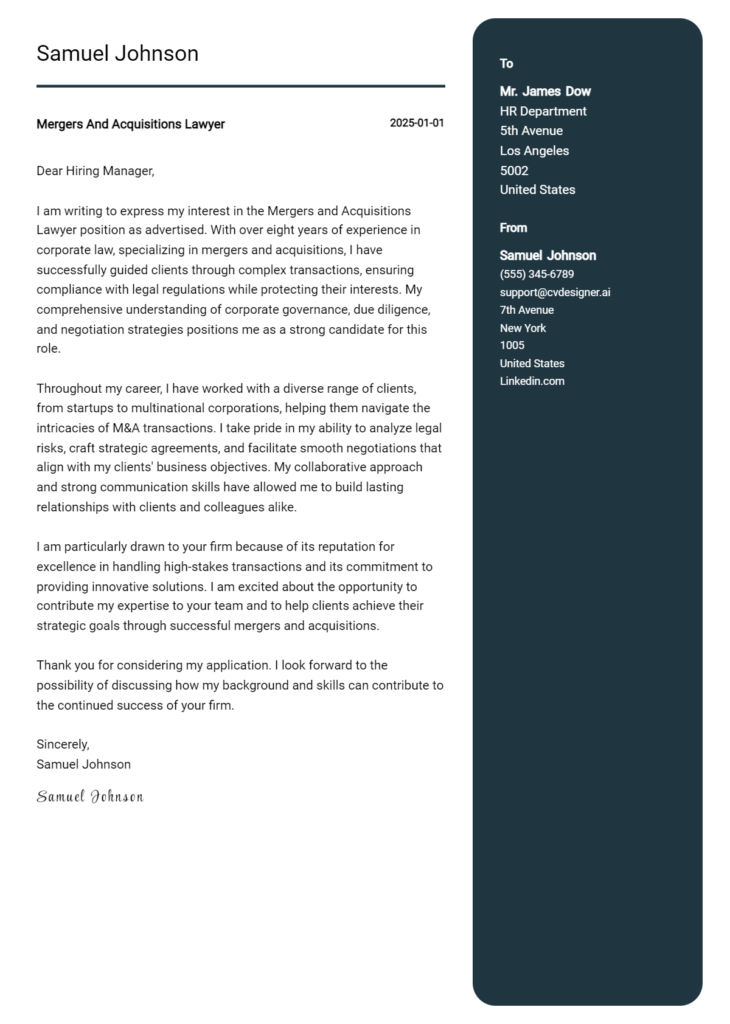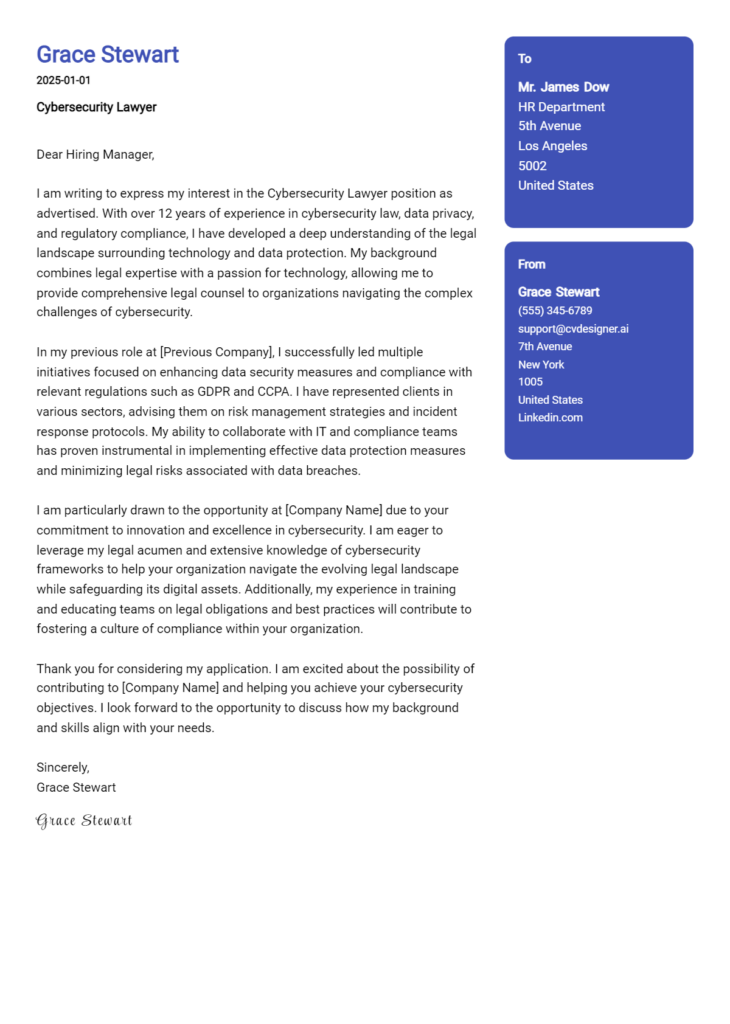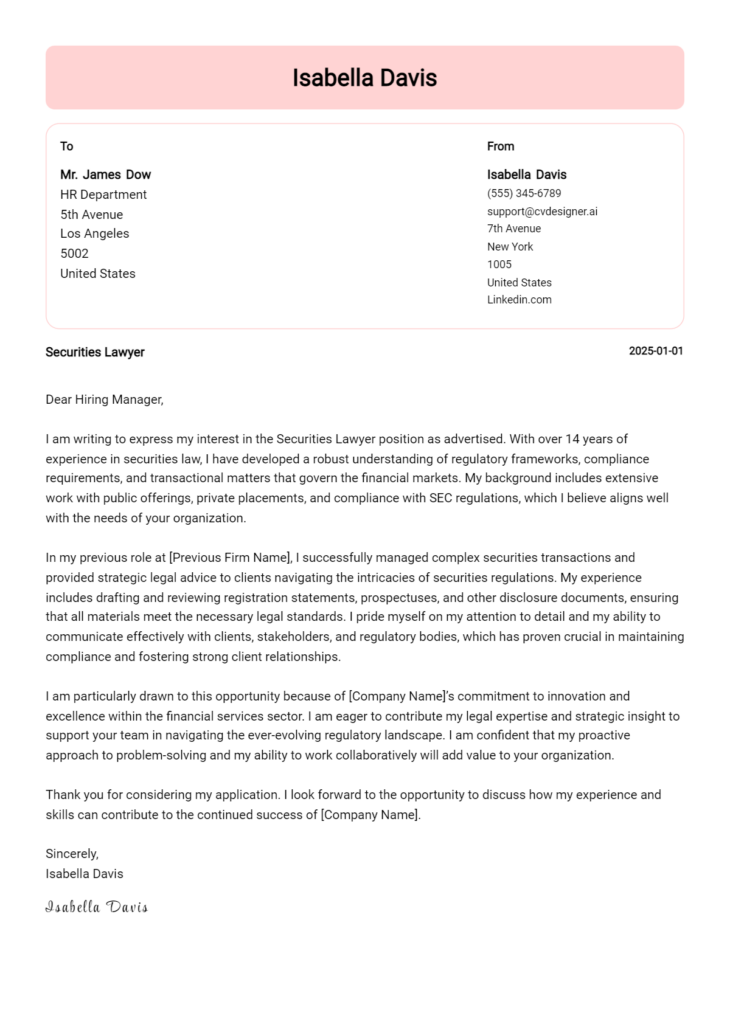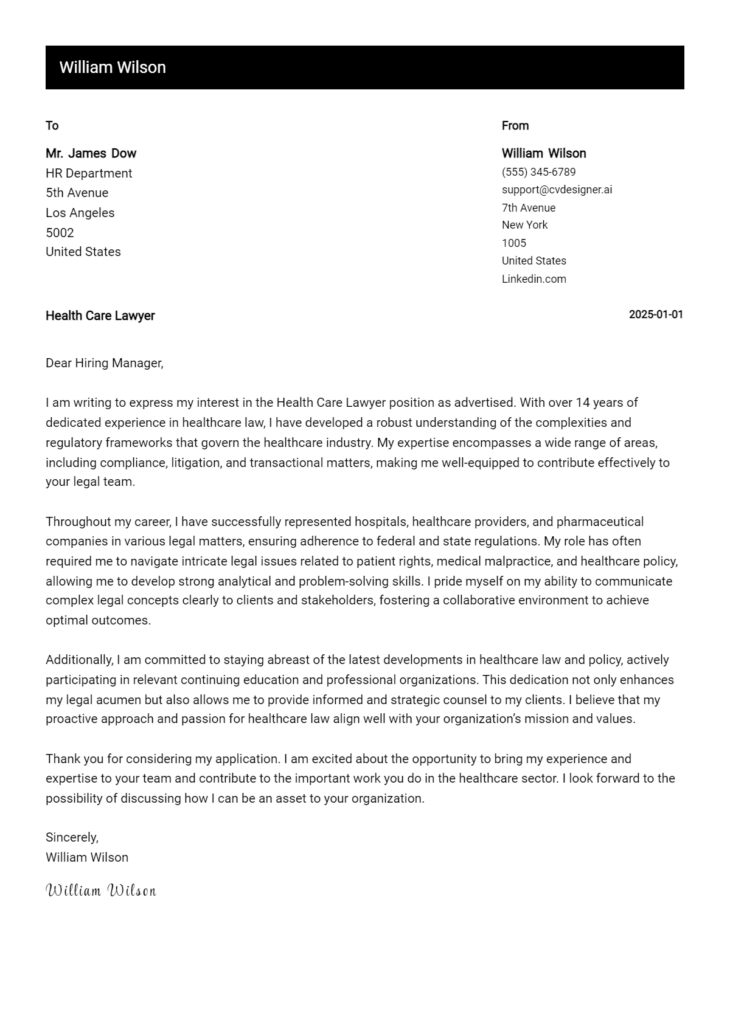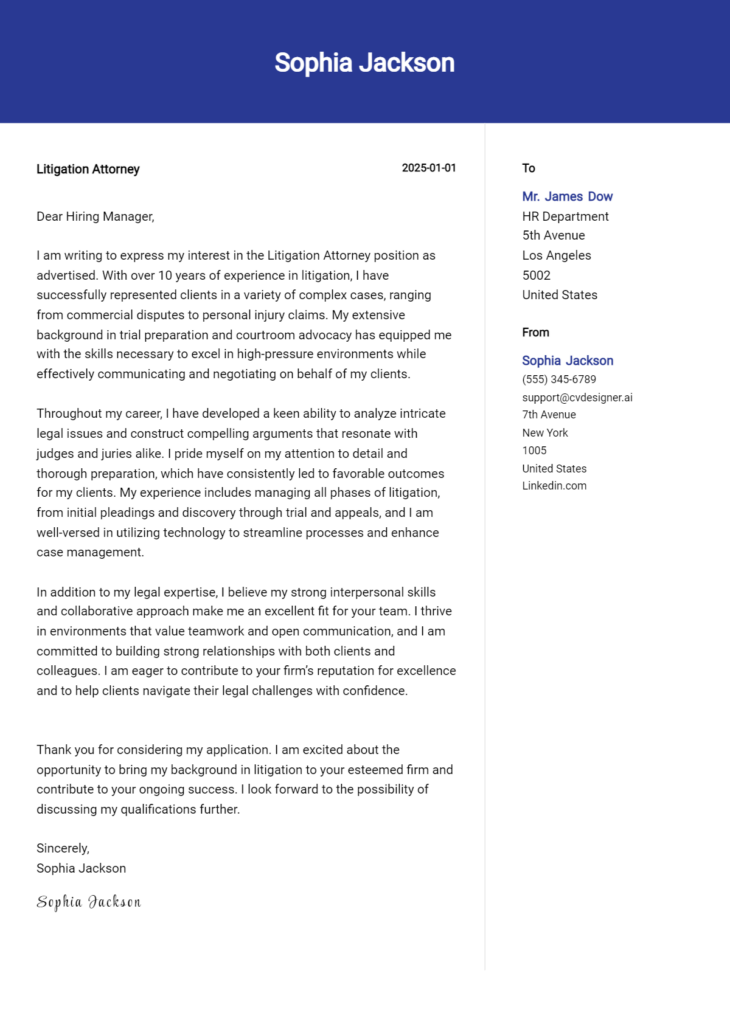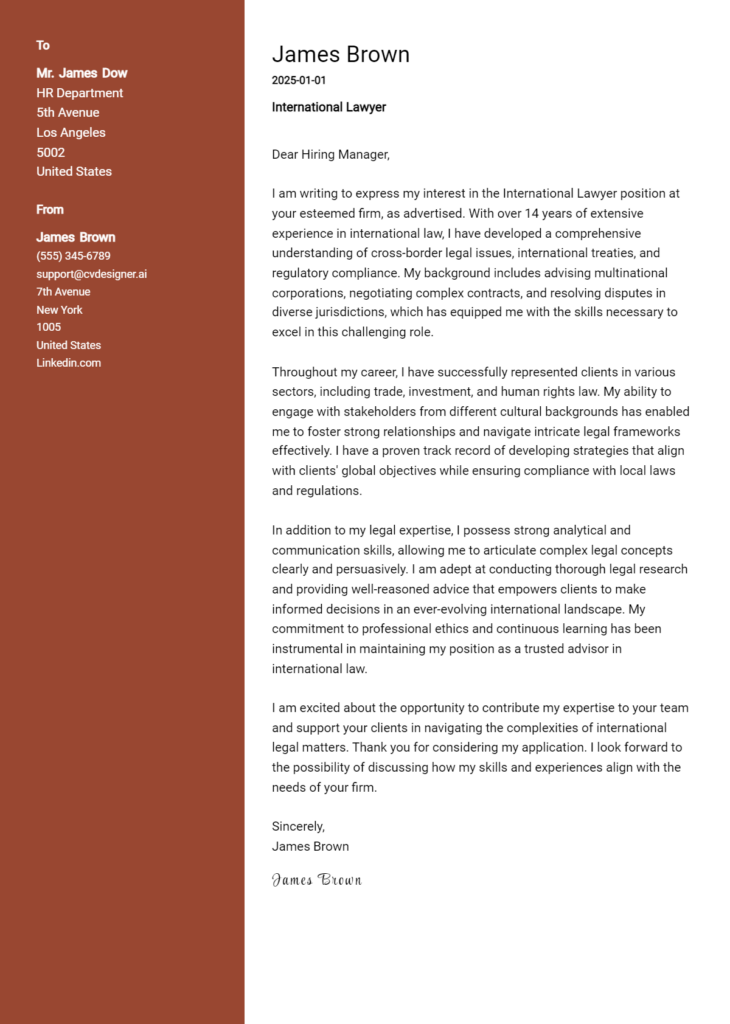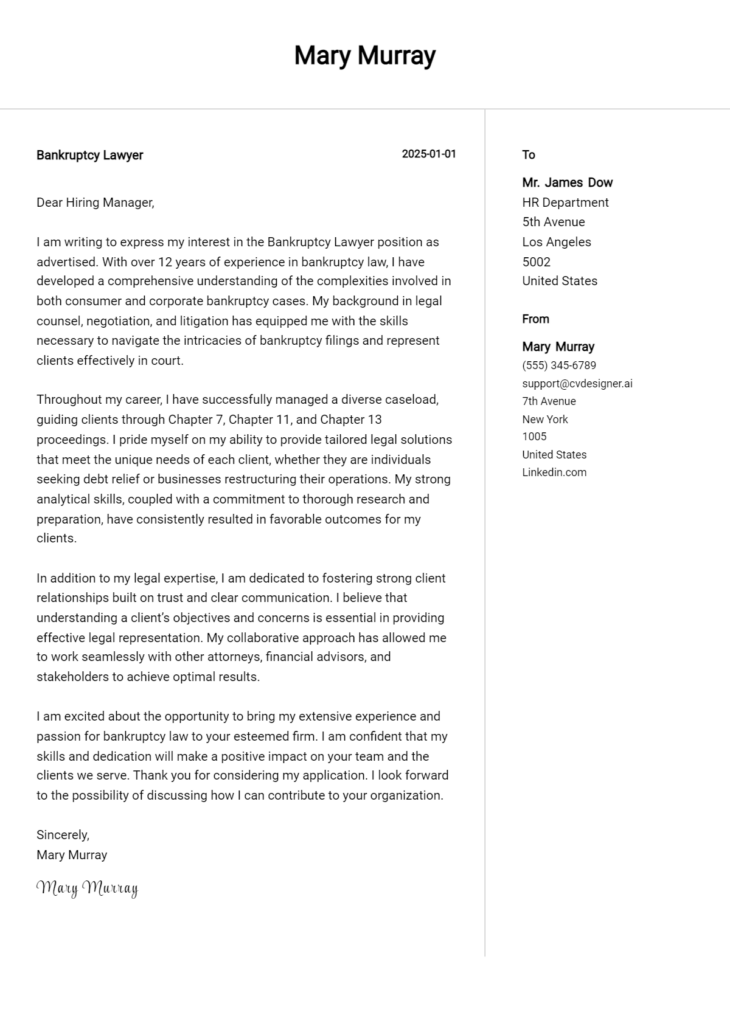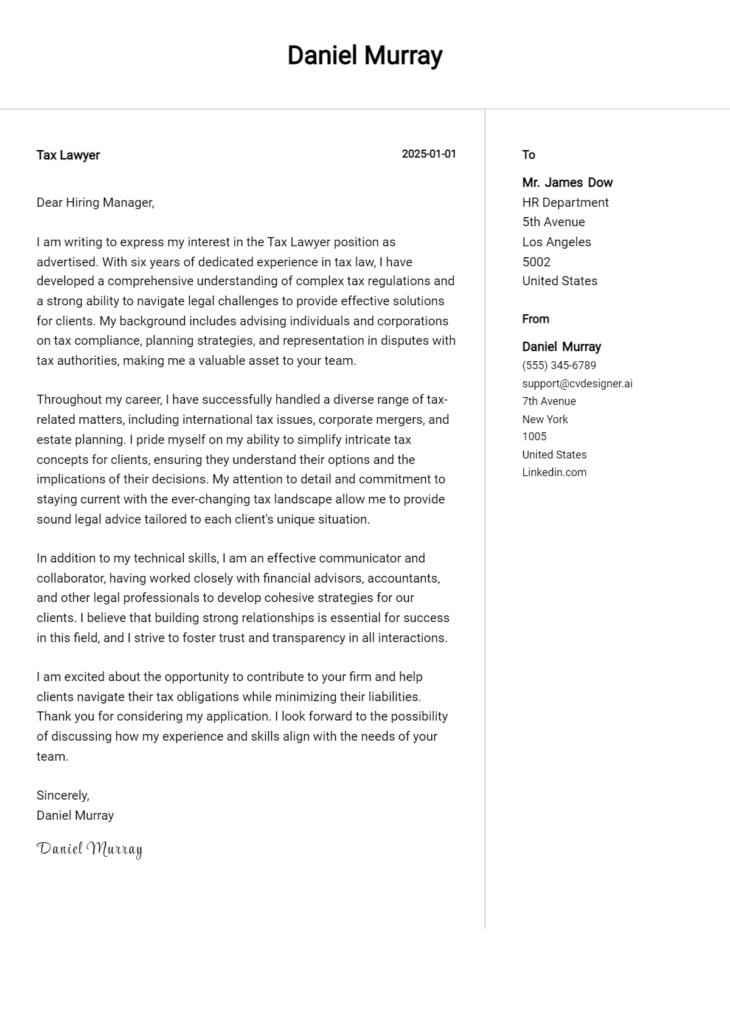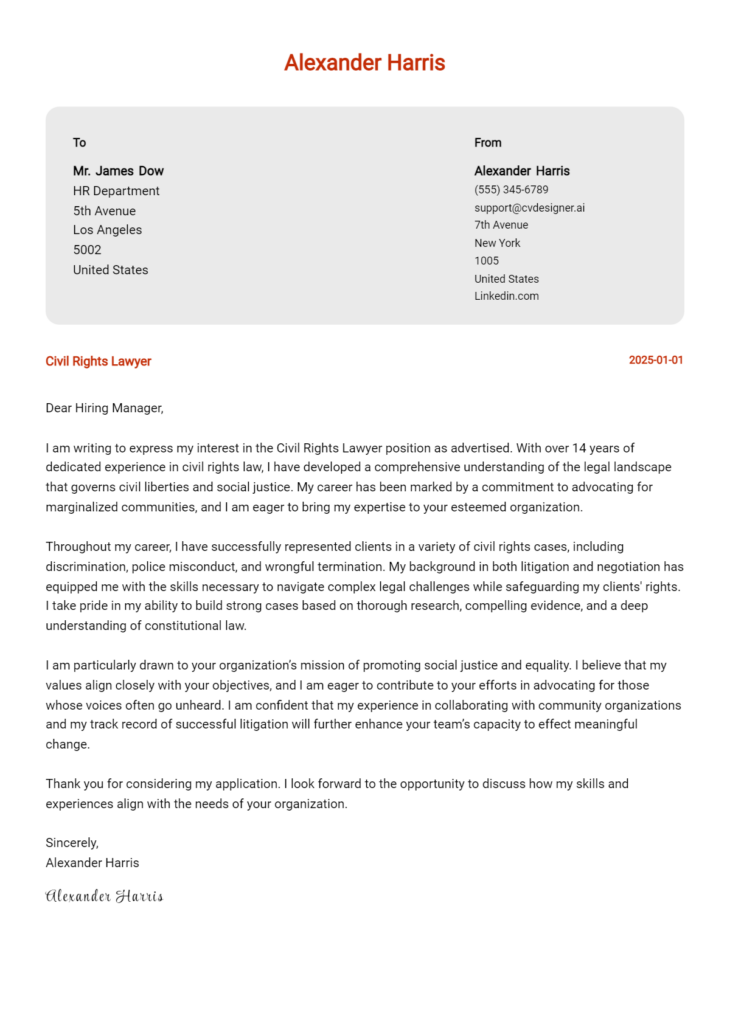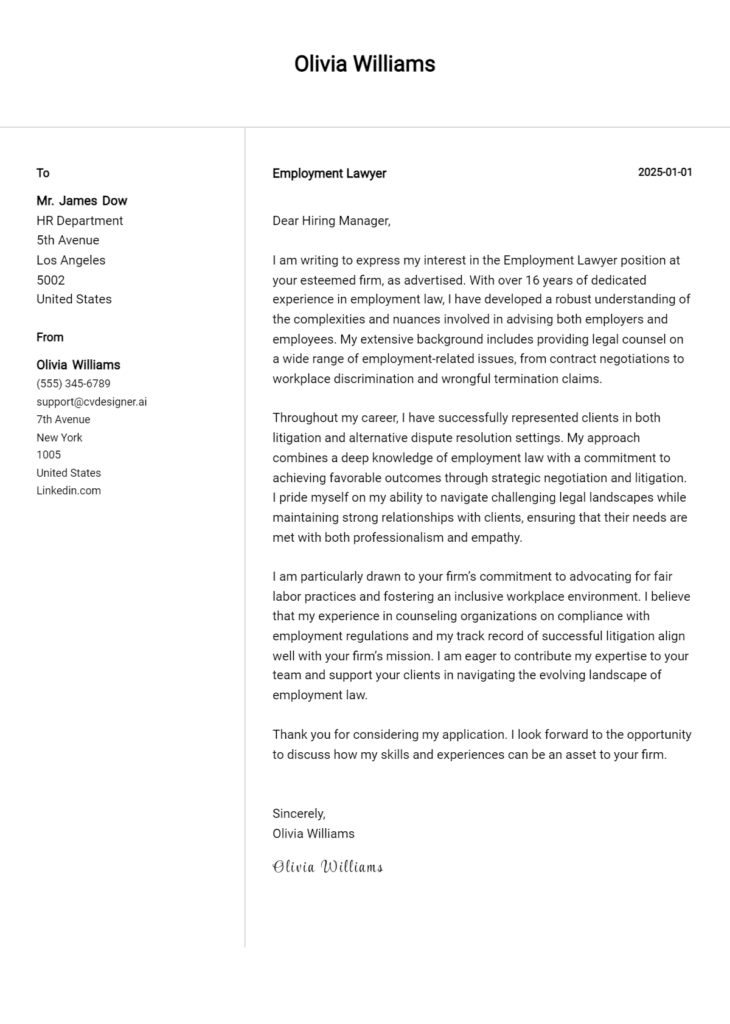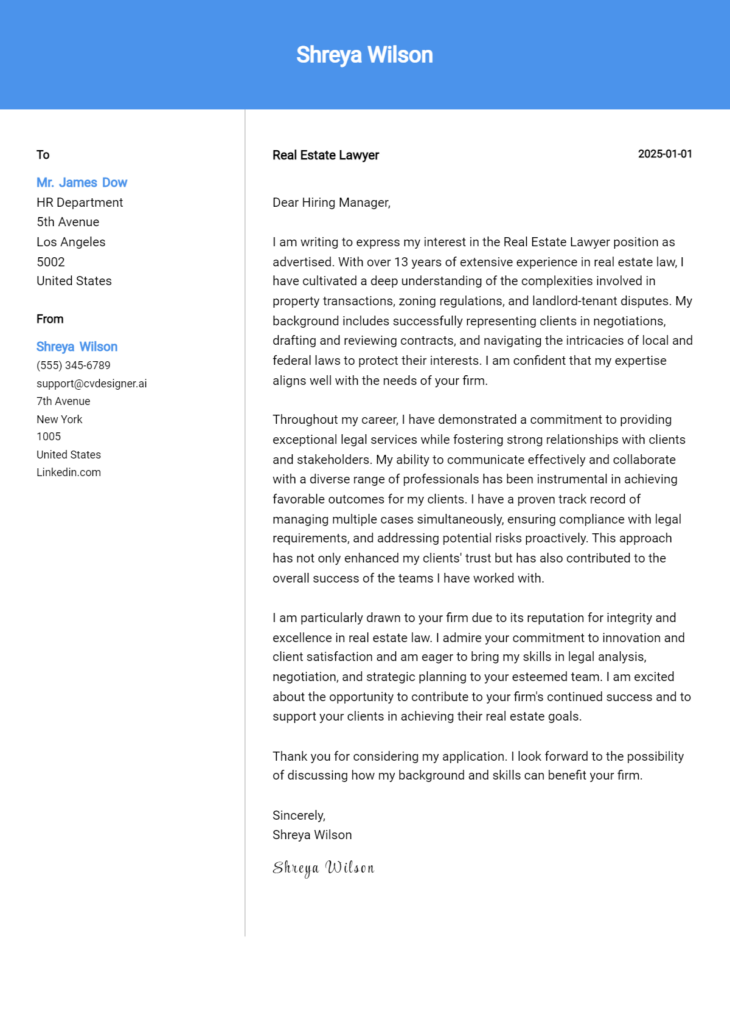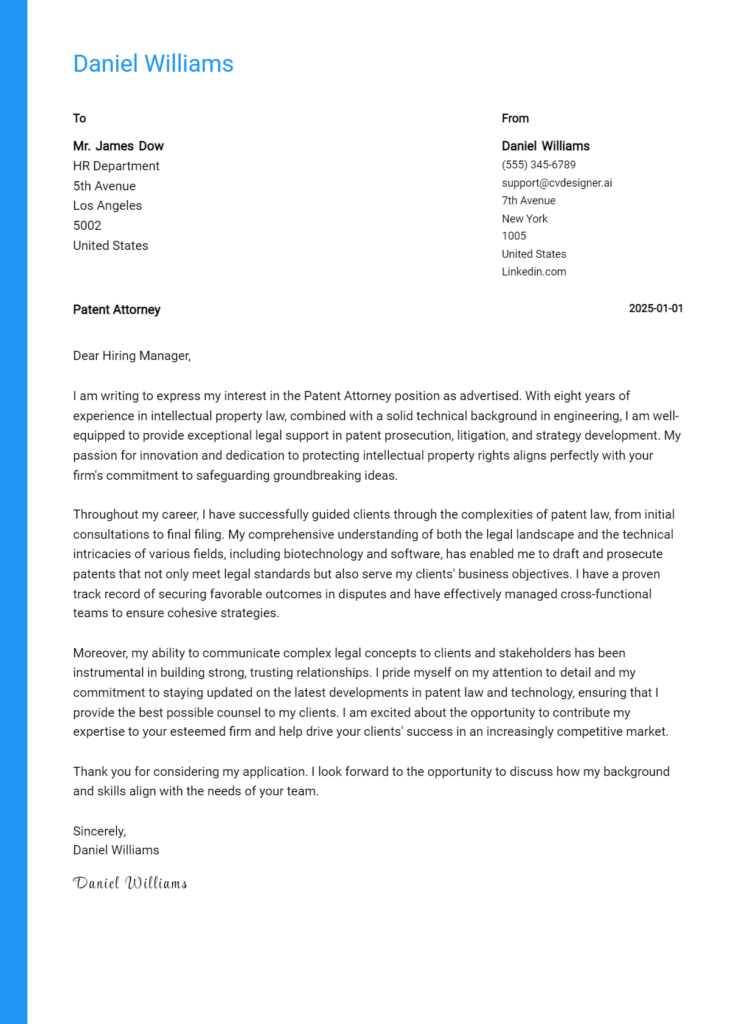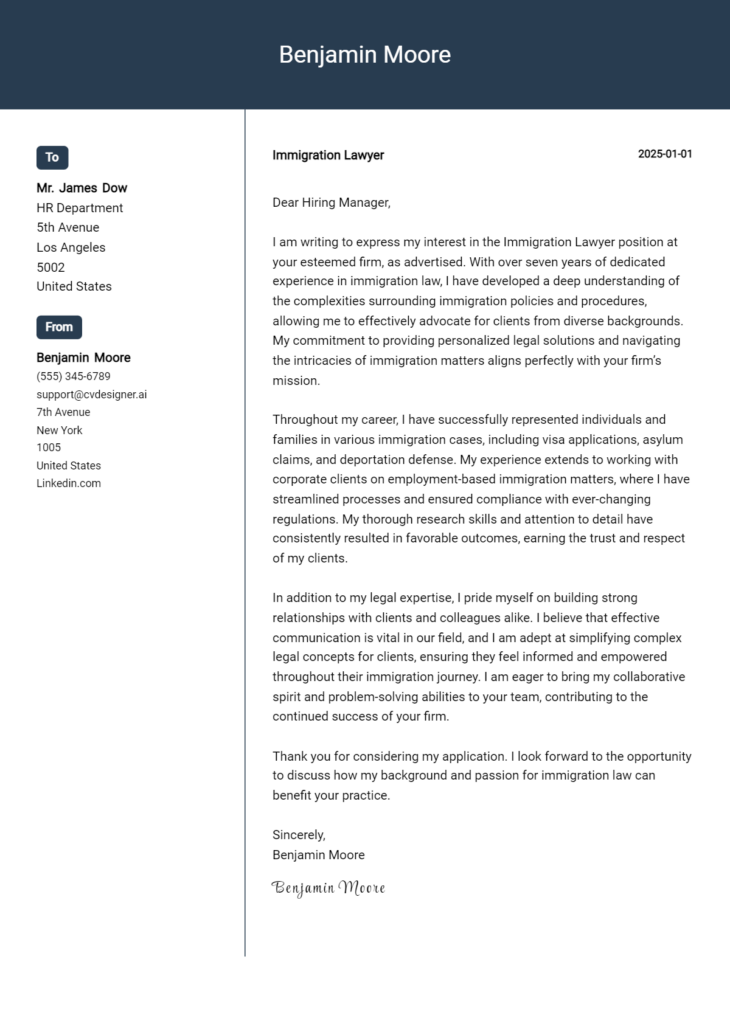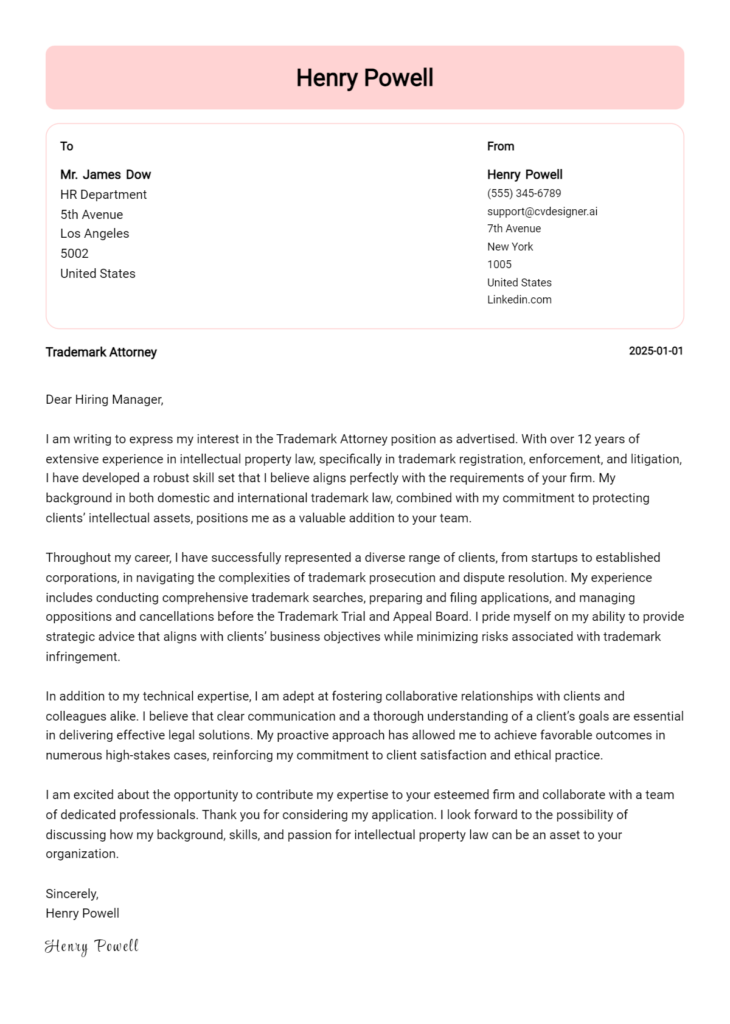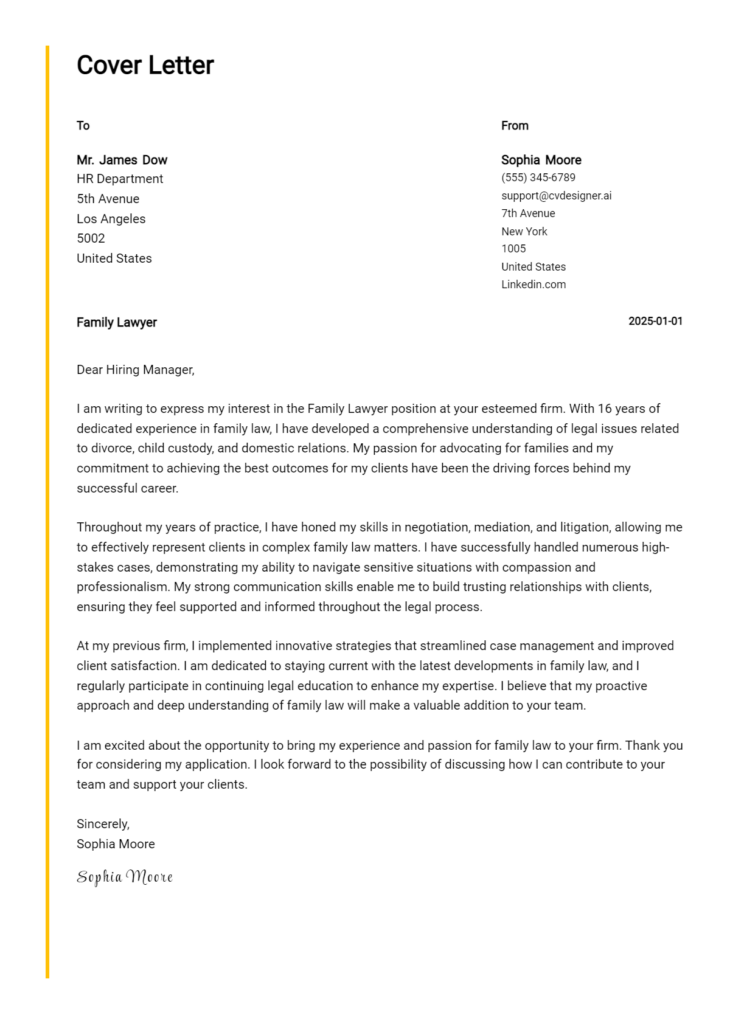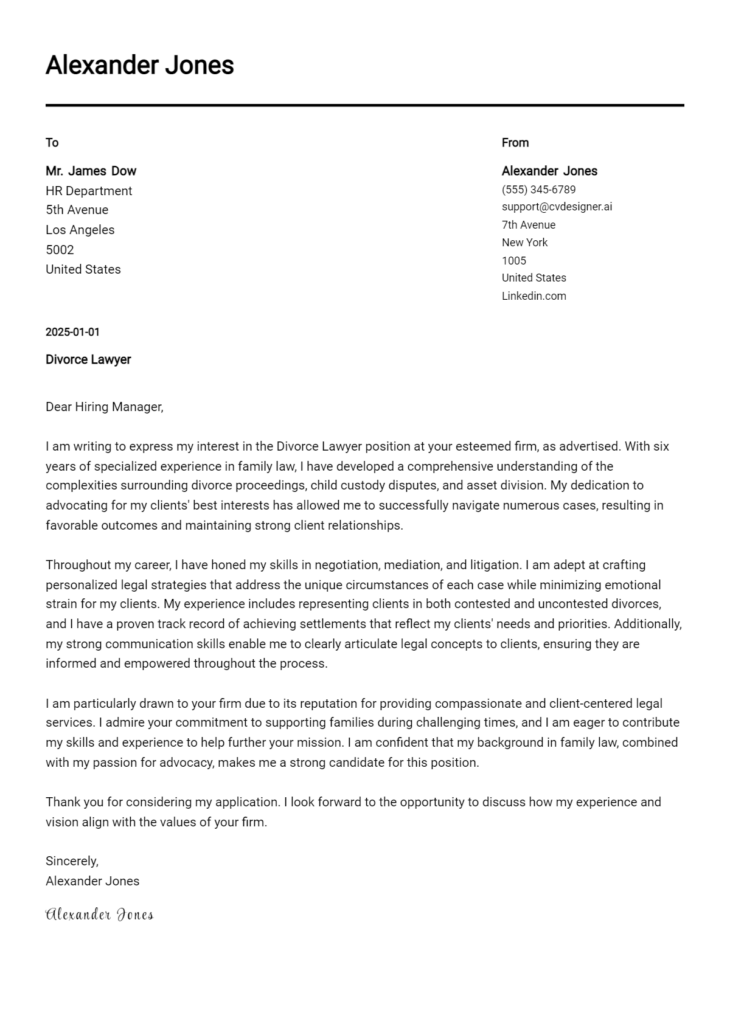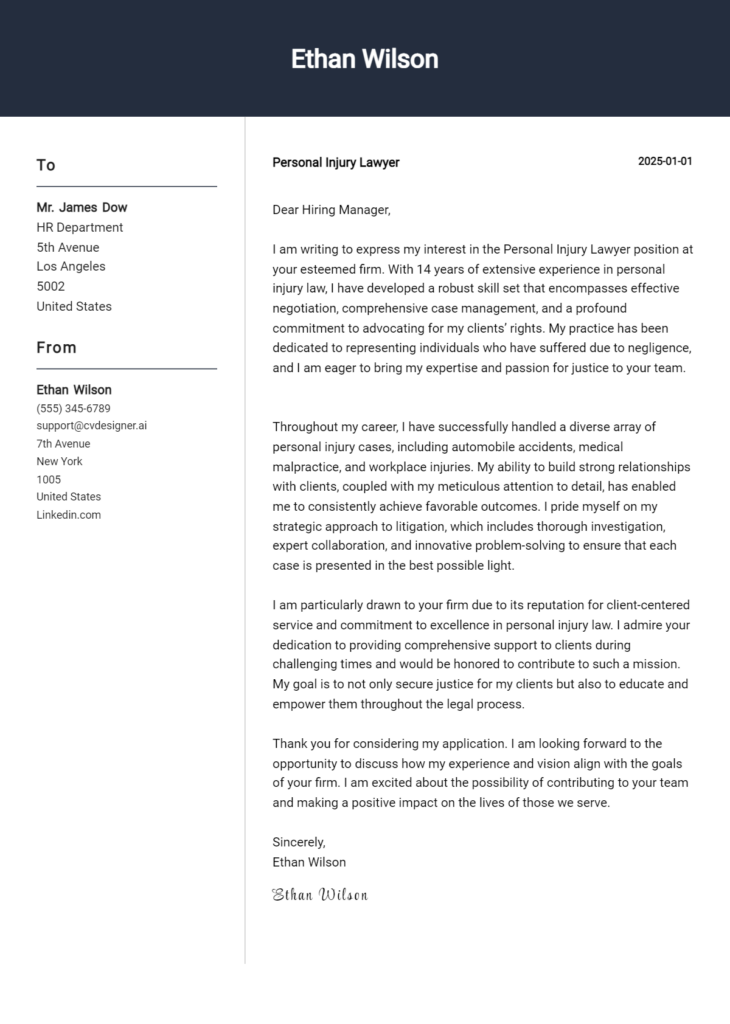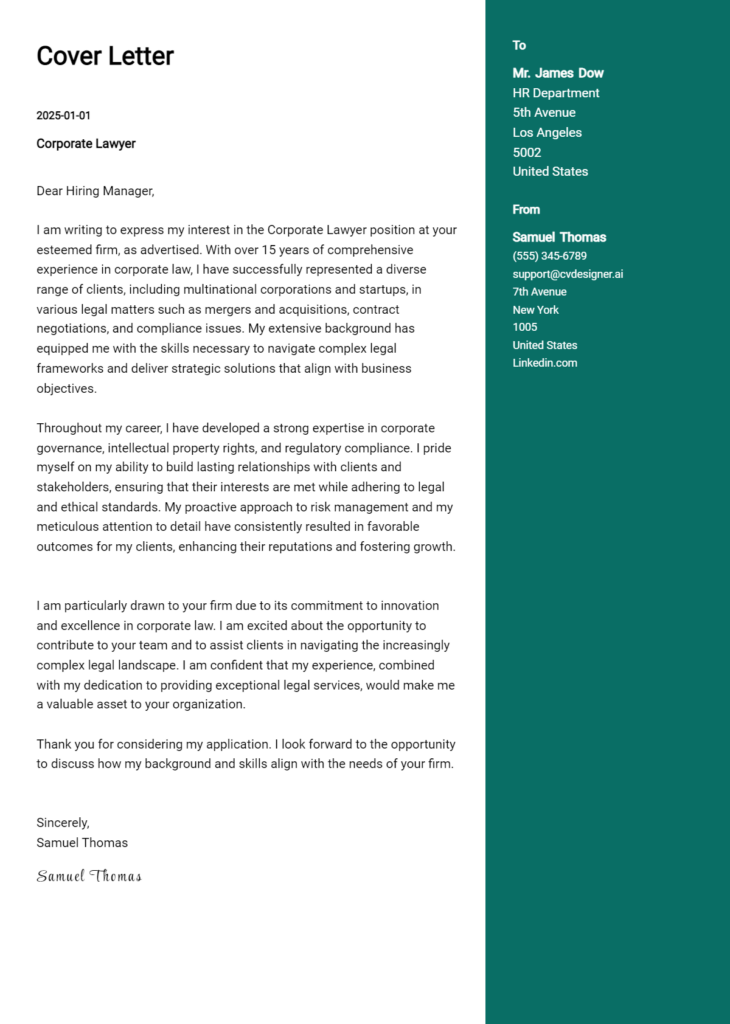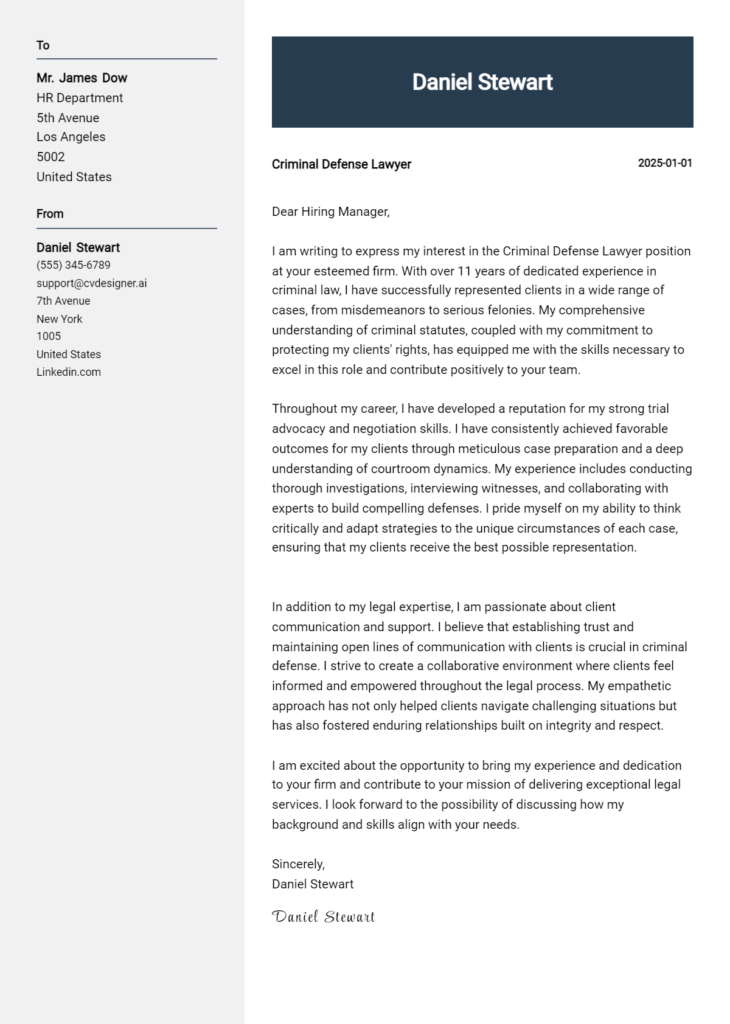Intellectual Property Lawyer Cover Letter Examples
Explore additional Intellectual Property Lawyer cover letter samples and guides and see what works for your level of experience or role.
How to Format a Intellectual Property Lawyer Cover Letter?
Crafting a compelling cover letter is essential for an Intellectual Property Lawyer, as it serves as your first opportunity to make a lasting impression on potential employers. The way you format your cover letter not only reflects your legal acumen but also showcases your ability to communicate effectively—two critical skills in the field of intellectual property law. A well-structured cover letter assists in guiding the hiring manager through your qualifications, while also demonstrating your meticulous attention to detail.
In this guide, we will explore how to structure your cover letter to effectively convey your skills and experiences, including:
- Cover Letter Header
- Cover Letter Greeting
- Cover Letter Introduction
- Cover Letter Body
- Cover Letter Closing
Each section is vital in emphasizing your qualifications and professionalism. Let’s break down each part to help you create a standout cover letter tailored for an Intellectual Property Lawyer position.
The Importance of a Strong Cover Letter Header for an Intellectual Property Lawyer
A well-crafted cover letter header is crucial for an Intellectual Property Lawyer, as it sets the tone for professionalism and clarity in your application. This section should clearly present your contact information, the date of the letter, and the recipient's details, ensuring that all parties can easily identify and reach you. A strong header not only reflects your attention to detail but also demonstrates your understanding of legal formalities, which is vital in the field of intellectual property law.
Strong Example
Jane Doe 123 Legal Lane Law City, ST 12345 (123) 456-7890 jane.doe@email.com October 3, 2023 Mr. John Smith Head of Recruitment XYZ Law Firm 456 Attorney Avenue Law City, ST 12345
Weak Example
jane doe 123 legal lane law city, st 12345 October 3, 2023 xyz law firm 456 attorney avenue law city, st 12345
In the strong example, the header is formatted correctly with proper capitalization, clear contact information, and a professional presentation. In contrast, the weak example lacks capitalization and does not convey the same level of professionalism, which could negatively impact the impression you make on potential employers.
The Importance of the Cover Letter Greeting for an Intellectual Property Lawyer
The greeting of your cover letter serves as the initial point of contact between you and the hiring manager, setting the tone for the remainder of the letter. A well-crafted greeting not only demonstrates your professionalism but also adds a personal touch by addressing the recipient directly. This approach shows that you are genuinely interested in the position and have taken the time to research the company and its personnel. To avoid generic greetings, make the effort to find out the hiring manager's name, which can often be found on the company's website or through LinkedIn. A personalized greeting can make a significant difference in how your application is perceived.
Strong Greeting Example
Dear Ms. Johnson,
Weak Greeting Example
To Whom It May Concern,
The Importance of a Well-Crafted Cover Letter Introduction for an Intellectual Property Lawyer
A well-crafted cover letter introduction is pivotal for an Intellectual Property Lawyer, as it sets the tone for the entire application. This introduction must capture the hiring manager's attention immediately, expressing the candidate’s genuine interest in the role while briefly showcasing key skills or achievements relevant to intellectual property law. A strong introduction not only highlights the candidate’s qualifications but also demonstrates their enthusiasm for contributing to the firm’s success in protecting and managing intellectual property rights. Below are examples of both strong and weak introductions to illustrate the impact that a compelling opening can have on a cover letter.
Strong Example
Dear [Hiring Manager's Name], As a dedicated Intellectual Property Lawyer with over five years of experience successfully navigating complex patent and trademark cases, I am thrilled to apply for the position at [Company Name]. My passion for safeguarding innovation and my proven track record of securing favorable outcomes for my clients underscore my commitment to excellence in this field. I am particularly drawn to your firm's reputation for fostering creativity and its proactive approach to intellectual property management, and I am eager to contribute my expertise to your esteemed team.
Weak Example
To Whom It May Concern, I am writing to apply for the Intellectual Property Lawyer position. I have some experience in the legal field, and I think I could do a good job. I believe that intellectual property is important, and I am looking for a new opportunity.
Purpose of the Cover Letter Body for an Intellectual Property Lawyer
The cover letter body for an Intellectual Property Lawyer serves as a vital component in presenting the candidate's qualifications, experiences, and overall value to a potential employer. This section should effectively highlight specific projects or accomplishments that demonstrate the candidate's expertise in intellectual property law, such as successful patent applications, trademark registrations, or litigation outcomes. By articulating their skills and experiences with concrete examples, the candidate can create a compelling narrative that showcases their ability to contribute positively to the firm's goals and objectives.
Strong Example
Dear [Hiring Manager's Name], I am excited to apply for the Intellectual Property Lawyer position at [Company Name], as I believe my extensive experience in patent law and my track record of successfully navigating complex IP litigations align perfectly with the needs of your firm. In my previous role at [Previous Company Name], I successfully led a team that secured over 15 patents for innovative technologies, resulting in a 30% increase in revenue from IP licensing. Furthermore, I represented a client in a high-stakes copyright infringement case that culminated in a favorable settlement, reinforcing my commitment to protecting clients' intellectual assets. I am eager to bring my expertise in IP strategy and litigation to [Company Name] and help drive your clients' success in an increasingly competitive market. Sincerely, [Your Name]
Weak Example
Dear [Hiring Manager's Name], I am writing to apply for the Intellectual Property Lawyer position at [Company Name]. I have a background in law and think I would be a good fit for the job. I have worked on some IP cases before and understand the basics of patent and copyright law. I am looking for a new opportunity and hope to contribute to your company, but I haven't worked on any major projects that stand out. I am confident that I can learn quickly and be a team player. Best, [Your Name]
Importance of the Cover Letter Closing for an Intellectual Property Lawyer
The closing paragraph of a cover letter is crucial for leaving a lasting impression on potential employers, especially in the competitive field of intellectual property law. This section should effectively summarize your qualifications, reiterate your enthusiasm for the position, and encourage the reader to take the next steps, such as reviewing your resume or scheduling an interview. A strong closing not only reinforces your fit for the role but also demonstrates your professionalism and communication skills.
Strong Example
Thank you for considering my application for the Intellectual Property Lawyer position at [Company Name]. With my extensive background in patent law and my passion for protecting innovation, I am excited about the opportunity to contribute to your esteemed firm. I look forward to the possibility of discussing how I can apply my skills and experiences to help your clients navigate complex intellectual property challenges. Please feel free to review my attached resume, and I hope to schedule an interview at your earliest convenience.
Weak Example
I appreciate your time in reading my cover letter. I think I might be a good fit for the job. If you want to talk, you can look at my resume. Let me know what you think.
These tips will assist candidates in crafting an effective cover letter for the role of an Intellectual Property Lawyer. A well-written cover letter is crucial for standing out in this competitive field, as it allows you to showcase not only your legal expertise but also your technical skills, problem-solving abilities, knowledge of the Software Development Life Cycle (SDLC), teamwork experience, and a commitment to continuous learning. By highlighting these attributes, you can demonstrate to potential employers that you are the ideal candidate for their needs.
Tips for Writing a Cover Letter as an Intellectual Property Lawyer
Highlight Technical Skills: Begin your cover letter by showcasing your technical skills related to intellectual property law. Mention any specific software or legal research tools you are proficient in, such as patent databases or trademark search engines. This demonstrates your capability to handle the technical aspects of IP law effectively.
Emphasize Problem-Solving Abilities: Intellectual property law often involves navigating complex legal issues. Share examples of past cases where you successfully resolved disputes or helped clients protect their intellectual property rights. Use specific metrics or outcomes to illustrate your problem-solving skills, making your achievements tangible.
Demonstrate SDLC Knowledge: If you have experience with the Software Development Life Cycle, be sure to include it in your cover letter. Discuss how your understanding of SDLC can enhance your ability to advise clients in tech industries. Highlight any relevant projects where you provided legal guidance during the development process.
Showcase Teamwork Experience: Intellectual property lawyers frequently collaborate with other legal professionals, engineers, and business teams. Provide examples of how you have effectively worked in a team environment to achieve common goals. This could include partnerships in litigation, negotiations, or joint projects that required cross-functional collaboration.
Express a Passion for Continuous Learning: The field of intellectual property law is always evolving. Convey your commitment to staying updated on the latest trends, legal developments, and technologies. Mention any relevant courses, certifications, or seminars you have attended to illustrate your dedication to lifelong learning in your profession.
By integrating these elements into your cover letter, you can create a compelling narrative that highlights your qualifications as an Intellectual Property Lawyer. For additional resources, consider exploring cover letter templates or utilizing a cover letter builder to enhance your application further.
Common Mistakes to Avoid in an Intellectual Property Lawyer Cover Letter
Avoiding common mistakes in your cover letter is crucial for standing out in the competitive field of intellectual property law. A well-crafted cover letter can be the key to securing an interview, so it’s important to present yourself professionally and compellingly. Here are some common mistakes to watch out for, along with tips on how to avoid them:
Generic Content: Tailoring your cover letter to the specific firm and position is essential. Avoid using a one-size-fits-all approach. Research the firm’s focus areas and incorporate relevant information to show your genuine interest.
Neglecting Structure: A poorly formatted cover letter can detract from your qualifications. Follow a clear cover letter format to ensure your document is easy to read and professionally structured.
Focusing on Responsibilities Instead of Achievements: Employers are more interested in what you have accomplished rather than just listing your job duties. Highlight specific achievements and how they relate to intellectual property law.
Spelling and Grammar Errors: Typos can create a negative impression. Always proofread your cover letter or have someone else review it before submission to catch any mistakes.
Being Too Lengthy: Keep your cover letter concise—ideally one page. Avoid unnecessary details and focus on the most relevant experiences and skills that align with the role.
Lack of Personalization: Address the cover letter to a specific individual if possible. Avoid using generic salutations like “To Whom It May Concern” to demonstrate that you’ve done your homework.
Forgetting to Include a Call to Action: End your cover letter with a strong call to action, expressing your enthusiasm for the opportunity to discuss your application further. This shows initiative and confidence.
For more insights, you can check out some cover letter examples to guide you in crafting your own compelling narrative.
Cover Letter FAQs for Intellectual Property Lawyer
What should I include in my cover letter as an Intellectual Property Lawyer?
Your cover letter should highlight your relevant qualifications and experiences in intellectual property law. Start with a strong opening that captures attention, followed by a brief summary of your legal education and any specialized training in IP law. Include specific examples of your experience with patent applications, trademarks, copyright issues, or litigation related to intellectual property. Additionally, mention your familiarity with relevant laws, regulations, and practices. Finally, express your enthusiasm for the position and how your skills align with the firm’s needs and values.
How can I demonstrate my passion for intellectual property law in my cover letter?
To convey your passion for intellectual property law, share personal anecdotes or experiences that sparked your interest in the field. Discuss any relevant coursework, internships, or projects that deepened your understanding of IP issues. You might also mention your involvement in IP-related organizations or seminars. Highlight any cases you’ve worked on that had a significant impact on clients or industries. By illustrating your commitment and engagement with the field, you’ll show potential employers that you are not just qualified, but genuinely invested in intellectual property law.
Should I tailor my cover letter for each application?
Yes, tailoring your cover letter for each application is crucial for making a strong impression. Research the firm’s specific focus areas, recent cases, and overall culture. Adjust your examples and experiences to align with the firm's practice and values. If a firm specializes in patent law for technology companies, emphasize your experience in that niche. Personalizing your cover letter demonstrates your genuine interest in the firm and the position, increasing your chances of standing out in a competitive job market.
How long should my cover letter be as an Intellectual Property Lawyer?
Your cover letter should ideally be one page in length, containing three to four concise paragraphs. Aim for around 300 to 400 words. Keep your sentences clear and direct, focusing on the most relevant qualifications and experiences that make you a strong candidate for the position. Avoid unnecessary jargon and ensure that every sentence contributes to showcasing your suitability for the role. A well-structured, succinct cover letter is more likely to engage the reader and leave a positive impression.
Build your Cover Letter in minutes
Use an AI-powered cover letter builder and have your letter done in 5 minutes. Just select your template and our software will guide you through the process.

